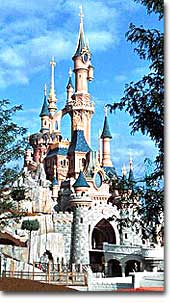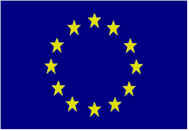60e. The End of the American Century

Disneyland Paris was the object of intense resistance by French citizens who feared U.S. cultural influence would undermine French traditions. Despite these concerns, the park still manages to draw over 10 million visitors each year.
In 1900, the United States was an emerging giant. In the midst of its second industrial revolution, America had just begun to acquire an overseas empire and international influence.
During the first half of the 20th century, the United States proved to be the decisive combatant in two major world wars, earning the right to determine a post war outcome. The Cold War that plagued the world in the last half of the 20th century proved in the end to be an American victory as well.
American scientists had developed nuclear technology, the computer, put human beings on the moon, and were at the vanguard of immunization techniques.
America's postwar economy was the envy of the globe. A consumer-driven middle class built the highest standard of living in the world. American popular culture was everywhere. Levi's jeans, Coca-Cola, McDonald's, and Hollywood movies were enjoyed around the world.
When the Soviet Union collapsed in 1991, the United States was the only remaining military superpower, and the world looked to Washington for leadership at combating aggression in the Persian Gulf, ending ethnic cleansing in places such as Kosovo, and halting nuclear proliferation.
The North American Free Trade Agreement (NAFTA) ended economic barriers with Canada and Mexico and promised even more prosperity.
Why then did so many Americans feel uneasiness and uncertainty as the 21st century approached? Economic challenges were created by the prosperous Pacific Rim and a stronger European Union. Despite prosperity, real incomes stagnated for the bottom half of American wage earners. Although legal barriers to equality were largely eliminated for American minority groups, economic equality was but a dream. Women made advances toward equity, but still earned less than 75 cents for every dollar earned by American males. Many Americans felt they were working longer hours for less.

The European Union, whose flag is seen above, is an organization of 15 European countries working together to manage political and economic cooperation. From 1999 to 2002, member nations will be adopting the "Euro" as the new, single currency of Europe.
Pessimists depicted America as a civilization in decline. The rise of the divorce rate led to many children being raised in broken homes. Gun violence was a major problem. School shootings became commonplace. When two students entered Columbine High School in Littleton, Colorado in April 1999 with weapons, they murdered thirteen people before taking their own lives. Critics pointed to a media that glorified and promoted violence, permissive gun laws, failing schools, and neglectful parenting.
Environmentalists observed the ominous dwindling of rainforests and global warming trends. Disasters such as the Exxon Valdez oil spill of 1989 and rising gasoline prices in 2000 illustrated America's embarrassing dependency on fossil fuels and the ecological and economic havoc that resulted.
Will the 21st century also be an American century? Or will the United States be eclipsed by new superpowers like China or the European Union? Only time will reveal the answers.
In the meanwhile, the United States will rely on its history of increasing democracy and respect for human rights, its dynamic diversity, and the innovative character of its people to seek new solutions to whatever problems may arise.






